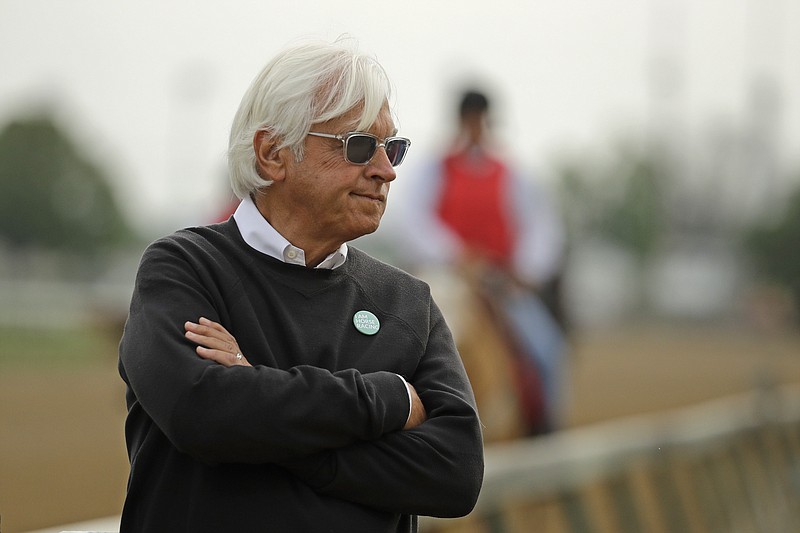HOT SPRINGS -- Hall of Fame trainer Bob Baffert has added another Arkansas Derby champion to his resume.
But he's not a new champion.
A ruling from last summer by Oaklawn stewards that two racehorses from the barn of Baffert tested positive beyond the allowable threshold for a common pain-masking drug was upheld by the Arkansas Racing Commission after hearings Monday and Tuesday. However, mitigating circumstances led the commission to eliminate a 15-day suspension it originally gave Baffert; to reinstate the results of his now 4-year-old horses Charlatan and Gamine from May 2020 at Oaklawn; and to give the winner's shares of the prize money to their owners.
Charlatan is now the official winner of the 2020 Arkansas Derby, and his owners will receive $300,000 of the purse. Gamine is the winner of an optional-claiming race, and her owners will get the $36,000 winner's share.
Both races were run May 2 at Oaklawn Racing Casino Resort.
Both horses tested positive beyond the accepted threshold for lidocaine after the races. Baffert was fined $5,000 for each of the horses' positive tests for a total of $10,000.
The Arkansas Racing Commission's seven members unanimously voted to reduce the significance of Baffert's penalties.
Baffert smiled, thanked the hearing's participants and rushed from the conference room used for the hearings in Oaklawn's new hotel. He pointed toward his attorneys.
"Talk to these men," Baffert said. "I have a flight to catch."
Baffert was represented by attorneys Craig Robertson of Lexington, Ky., and Steve Quattlebaum of Little Rock. Owners of Charlatan were represented by attorney Justin Allen of Sheridan.
"I'm very happy," Robertson said. "I'm very grateful that the Arkansas Racing Commission did what we believe was the right thing, and so we're elated we got what we believe was a just result."
Quattlebaum said he, too, was pleased.
"Restoring the winners is something that needed to happen, and that was the right thing to do," Quattlebaum said. "Of course, Mr. Baffert did not deserve any suspension under these circumstances."
Baffert's lawyers both said the fines were appropriate.
"There was a positive finding," Quattlebaum said. "It is appropriate for the industry for there to be a consequence of that, that matches these facts and circumstances, which that probably does."
The commission's attorney was Byron Freeland of Little Rock. He said he was not surprised by the ruling.
"It's pretty rare that we have [a testing result] where you think somebody was really trying to cheat," Freeland said. "Especially with a big-name trainer and a big race like that, because they know they're going to be tested."
Baffert, who testified during the hearing Tuesday, said the veterinarians who treat his horses do not use lidocaine for any reason.
"We don't use it," he said. "We would never use it. We just don't use things like that. That's not the way we operate."
Evidence introduced indicated a possible source of lidocaine in the amount detected might have been from a patch that Baffert's assistant trainer Jimmy Barnes wore for back pain. Specifically, Barnes said in a deposition he wore an over-the-counter Salonpas Pain Relieving Patch.
Testimony that lasted nearly 13 hours over the two days primarily concentrated on the chain of custody of blood and urine samples taken from the two horses and missing documentation thereof -- a clerical error as to Charlatan's designation -- and the role testing thresholds of lidocaine play in terms of performance enhancement.
As for the chain of custody, Oaklawn's test-barn manager express-mailed the horses' samples to the lab contracted by Oaklawn to test them, Truesdail Laboratories. However, Truesdail lost its accreditation to test horse samples in March 2020 and subsequently informed the commission's veterinarian Joe Lokanc that it had subcontracted Industrial Testing Laboratory Services to test all samples sent by Oaklawn after March 17, 2020, including those from Baffert's horses in question. The samples were repackaged with others and shipped to Industrial, but they were sent without required documentation.
Testing specialist Ted Schulz testified Tuesday that the omission alone was a "fatal flaw," nearly duplicating testimony from another specialist Monday.
For an unspecified reason, Charlatan, a colt, was listed as a gelding in paperwork sent from Truesdail to Industrial. Testosterone is virtually nonexistent in gelded horses. Tests for testosterone in Charlatan were reported as negative, an impossible result from a colt, and a result that raised questions about all others.
The threshold for allowable lidocaine in racehorses is 20 picograms, which is 20 trillionths of a gram. Pharmacologist Clara Fenger, an independent veterinarian who spent 15 years as the state veterinarian for the Kentucky Racing Association, said in testimony Tuesday that one picogram is the approximate weight of the DNA contained in a single human cell.
Gamine's tested blood level for lidocaine was 185.4 picograms and Charlatan's 46.1, well above the threshold, but Fenger said lidocaine had "... absolutely no pharmacological effect" on horses below a level of 840 picograms.
Arkansas Racing Commission Chairman Alex Lieblong asked Fenger whether she thought the 20 picogram threshold was "hogwash." Fenger said she did.
Lieblong said he was satisfied by the result of the hearing.
"I'm sure some people are not happy with our decision, but I believe what we decided was fair," he said. "Sometimes it's not pretty watching people make sausage, but it is what it is."
Kathy Guillermo, the senior vice president of the People for the Ethical Treatment of Animals, released a statement expressing her displeasure with the ruling.
"Bob Baffert once alleged that poppy seed bagels were responsible for the morphine in a horse's system, but his gamut of obviously ridiculous excuses isn't a joke to Gamine and Charlatan, who were victims of an illicit drug," she said in the statement. "No matter how the medication got into the horses, Baffert is responsible -- and it's the duty of a racing commission to enforce the law as written."
